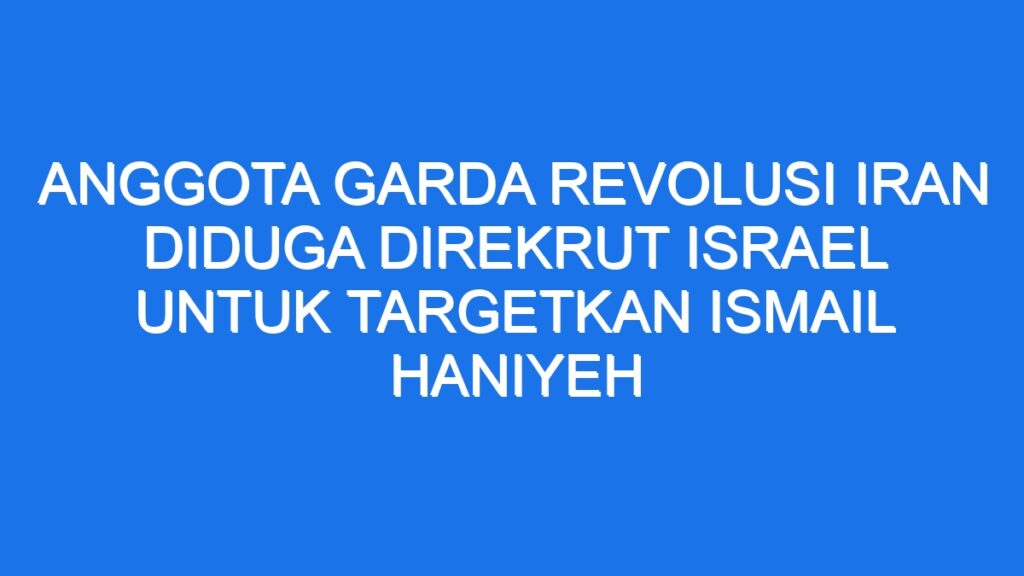Current Events and Tensions: Israel Iran News

The Israel-Iran relationship remains fraught with tension, characterized by a complex web of historical grievances, ideological differences, and ongoing proxy conflicts. While direct military confrontation has been avoided, both countries engage in a shadow war, employing covert operations, cyberattacks, and regional alliances to advance their respective interests. Recent developments have further heightened tensions, prompting renewed concerns about the potential for escalation.
Recent Developments and Statements
The recent escalation of tensions can be attributed to several key factors. One significant event was the assassination of Iranian nuclear scientist Mohsen Fakhrizadeh in November 2020, widely attributed to Israel. This incident further fueled Iranian anger and prompted calls for retaliation. In response, Iran has accelerated its nuclear program, exceeding the limits set by the Joint Comprehensive Plan of Action (JCPOA), the 2015 nuclear deal. The United States, under President Trump, withdrew from the JCPOA in 2018 and reimposed sanctions on Iran. This move significantly hampered Iran’s economy and further strained relations with the West. The Biden administration has expressed its willingness to return to the JCPOA, but negotiations have stalled due to Iran’s demands for the lifting of all sanctions.
Historical Context and Underlying Issues

The Israel-Iran conflict is a complex and multifaceted issue with deep historical roots, encompassing religious differences, territorial disputes, and geopolitical rivalry. Understanding the historical context is crucial for comprehending the current tensions and potential pathways for resolution.
Religious Differences
The religious differences between Israel and Iran are a significant source of tension. Israel, a Jewish state, and Iran, a predominantly Shia Muslim nation, have long-standing religious and ideological differences. The conflict is often framed as a clash between Judaism and Islam, with each side viewing the other as a threat to its religious identity and security.
Territorial Disputes
Territorial disputes are another key aspect of the Israel-Iran conflict. Iran has long supported Palestinian groups seeking to establish an independent state in the territories occupied by Israel. Iran’s support for these groups, coupled with its own territorial ambitions in the region, has further escalated tensions.
Geopolitical Rivalry
The Israel-Iran conflict is also intertwined with broader geopolitical rivalry in the Middle East. Both countries have sought to exert influence in the region, competing for resources, alliances, and strategic advantage. This rivalry has played out in proxy wars, arms races, and diplomatic maneuvers, contributing to a climate of mistrust and hostility.
Impact of Past Conflicts and Agreements
The history of the Israel-Iran conflict is marked by periods of war, conflict, and occasional attempts at rapprochement. The 1979 Islamic Revolution in Iran, which led to the establishment of an Islamic Republic, further strained relations between the two countries. The Iran-Iraq War (1980-1988) and the First Gulf War (1990-1991) further heightened tensions in the region, with both countries aligning with opposing sides. The 2015 nuclear deal between Iran and the international community, which included the lifting of sanctions on Iran in exchange for limitations on its nuclear program, was a significant step towards de-escalation. However, the US withdrawal from the deal in 2018 and the subsequent re-imposition of sanctions have raised concerns about a return to conflict.
International Implications and Regional Dynamics

The Israel-Iran conflict extends beyond the immediate borders of these two nations, impacting the broader Middle East and drawing in international actors with diverse interests. The complex interplay of regional alliances, security concerns, and economic considerations creates a dynamic landscape where the conflict’s reverberations are felt far and wide.
Influence of International Actors
The Israel-Iran conflict has attracted the attention of several international players, each with its own agenda and approach.
- The United States has long been a staunch ally of Israel and a key player in the Middle East. The US has consistently opposed Iran’s nuclear program and its support for militant groups in the region. The US has imposed economic sanctions on Iran and has engaged in military operations targeting Iranian-backed forces in Syria and Iraq. However, the US has also sought to engage with Iran on issues such as the nuclear deal and the fight against ISIS.
- Russia has emerged as a significant player in the Middle East, particularly in Syria, where it has supported the government of Bashar al-Assad. Russia has also cultivated close ties with Iran, providing it with military and economic support. Russia’s involvement has complicated efforts to resolve the Israel-Iran conflict, as it has sought to balance its interests with those of its allies.
- The European Union has been a vocal critic of Iran’s nuclear program and its human rights record. The EU has imposed sanctions on Iran and has supported the Joint Comprehensive Plan of Action (JCPOA), a nuclear deal between Iran and world powers. However, the EU has also sought to maintain economic ties with Iran and to promote dialogue between Iran and Israel.
Impact on the Wider Middle East, Israel iran news
The Israel-Iran conflict has had a profound impact on the Middle East, influencing regional alliances, security concerns, and economic stability.
- Regional Alliances: The conflict has reinforced existing alliances and fostered new ones. Israel has strong military and political ties with the United States, while Iran has cultivated alliances with countries like Syria, Lebanon, and Yemen. The conflict has also led to the formation of regional blocs, such as the Gulf Cooperation Council (GCC), which comprises Saudi Arabia, the United Arab Emirates, Kuwait, Bahrain, Qatar, and Oman. These alliances have shaped the regional security landscape and have influenced the course of the conflict.
- Security Concerns: The Israel-Iran conflict has heightened security concerns in the Middle East. Both Israel and Iran have engaged in proxy wars and covert operations in the region. The conflict has also led to a proliferation of weapons and an increase in the risk of unintended escalation. This has created a climate of uncertainty and instability, making it difficult to address other regional challenges.
- Economic Stability: The conflict has had a negative impact on the economies of the region. The sanctions imposed on Iran have hurt its economy and have limited its ability to invest in development. The conflict has also disrupted trade and investment flows in the region, hindering economic growth. Moreover, the conflict has diverted resources away from development projects and has contributed to regional instability, which has discouraged foreign investment.
Potential for Regional Cooperation
Despite the challenges, there is potential for regional cooperation and conflict resolution.
- Shared Interests: Despite their differences, Israel, Iran, and other regional actors share some common interests, such as combating terrorism, promoting economic development, and addressing climate change. These shared interests could provide a basis for cooperation and dialogue.
- Dialogue and Diplomacy: A key step towards conflict resolution is dialogue and diplomacy. The establishment of communication channels and the creation of platforms for discussion could help build trust and understanding. This could involve direct talks between Israel and Iran, as well as multilateral forums that bring together regional stakeholders.
- Economic Incentives: Economic incentives could play a role in promoting cooperation and conflict resolution. For example, the development of regional infrastructure projects, such as energy pipelines or transportation corridors, could create economic opportunities and foster interdependence. This could also help to reduce the reliance on military solutions and encourage a more peaceful approach.
Israel iran news – It’s all over the news, the latest tension between Israel and Iran. It’s a right proper headache, innit? But, if you wanna know what time it is in Tel Aviv right now, you can check out israel time right now.
With all this going on, it’s important to stay informed, even if it’s just about the time difference!
The whole Israel-Iran thing is proper tense, innit? Like, it’s always on the news. But if you wanna get the lowdown on what’s actually happening in Israel, you need to check out israeli news – it’ll give you the full picture, not just the headlines.
Then you can actually understand the whole Israel-Iran situation better, you know?
